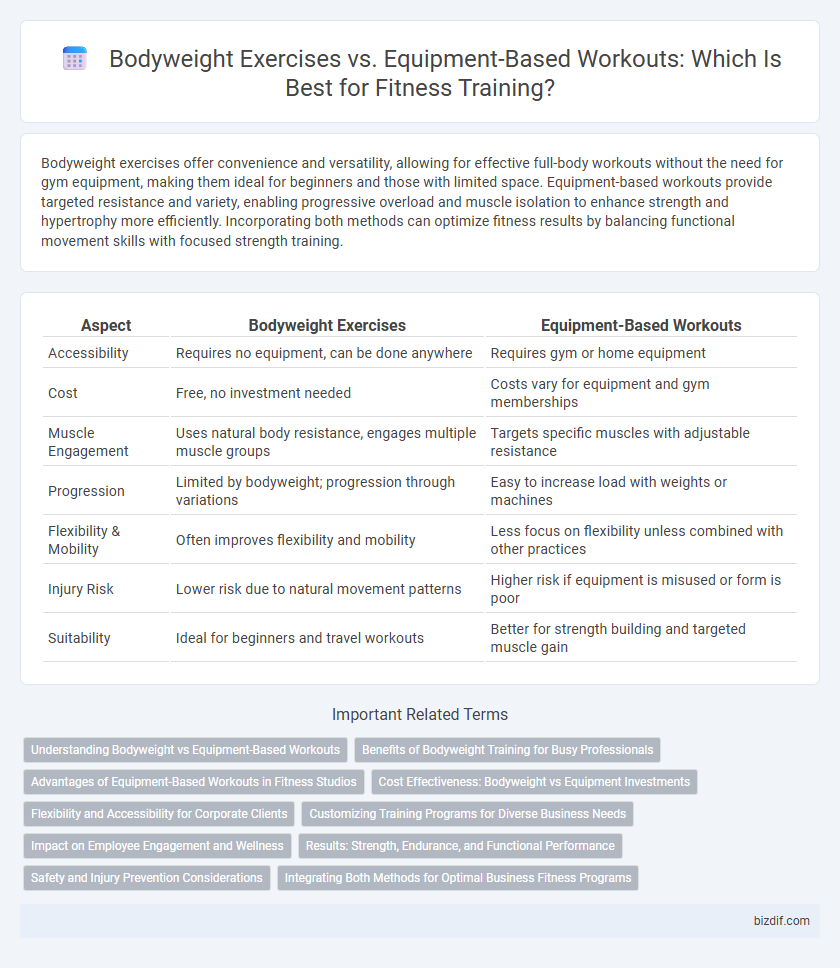Bodyweight exercises offer convenience and versatility, allowing for effective full-body workouts without the need for gym equipment, making them ideal for beginners and those with limited space. Equipment-based workouts provide targeted resistance and variety, enabling progressive overload and muscle isolation to enhance strength and hypertrophy more efficiently. Incorporating both methods can optimize fitness results by balancing functional movement skills with focused strength training.
Table of Comparison
| Aspect | Bodyweight Exercises | Equipment-Based Workouts |
|---|---|---|
| Accessibility | Requires no equipment, can be done anywhere | Requires gym or home equipment |
| Cost | Free, no investment needed | Costs vary for equipment and gym memberships |
| Muscle Engagement | Uses natural body resistance, engages multiple muscle groups | Targets specific muscles with adjustable resistance |
| Progression | Limited by bodyweight; progression through variations | Easy to increase load with weights or machines |
| Flexibility & Mobility | Often improves flexibility and mobility | Less focus on flexibility unless combined with other practices |
| Injury Risk | Lower risk due to natural movement patterns | Higher risk if equipment is misused or form is poor |
| Suitability | Ideal for beginners and travel workouts | Better for strength building and targeted muscle gain |
Understanding Bodyweight vs Equipment-Based Workouts
Bodyweight exercises leverage an individual's own weight to enhance strength, flexibility, and endurance, offering convenience and minimal cost. Equipment-based workouts utilize tools such as dumbbells, resistance bands, and machines to provide controlled resistance and target specific muscle groups more precisely. Understanding the benefits of each method helps optimize training goals by balancing accessibility, scalability, and muscle focus.
Benefits of Bodyweight Training for Busy Professionals
Bodyweight exercises offer busy professionals a flexible and efficient fitness solution, requiring no equipment and minimal space, making it easy to integrate workouts into tight schedules. These exercises enhance strength, flexibility, and cardiovascular health through functional movements that engage multiple muscle groups simultaneously. Consistent bodyweight training improves endurance and balance, promoting long-term health benefits without the need for gym access or expensive equipment.
Advantages of Equipment-Based Workouts in Fitness Studios
Equipment-based workouts in fitness studios offer targeted resistance training through machines and free weights, enhancing muscle growth and strength gains more efficiently than bodyweight exercises. These workouts allow precise load adjustments and variety, enabling progressive overload and preventing plateaus. Access to specialized equipment also supports rehabilitation and injury prevention by facilitating controlled and safe movement patterns.
Cost Effectiveness: Bodyweight vs Equipment Investments
Bodyweight exercises offer unmatched cost effectiveness by eliminating the need for expensive gym memberships or equipment purchases, making fitness accessible to all budgets. Equipment-based workouts often require significant upfront investments in machines or weights, plus ongoing maintenance costs. Investing in bodyweight training maximizes savings while promoting functional strength, flexibility, and endurance without financial barriers.
Flexibility and Accessibility for Corporate Clients
Bodyweight exercises offer unparalleled flexibility and accessibility for corporate clients, allowing workouts to be performed anywhere without the need for specialized equipment, making them ideal for busy schedules and limited spaces. Equipment-based workouts, while potentially providing targeted resistance and variety, often require access to a gym or investment in fitness tools, which may hinder consistent practice during work hours or travel. Prioritizing bodyweight routines enhances adherence and convenience for corporate fitness programs, promoting employee wellness without logistical barriers.
Customizing Training Programs for Diverse Business Needs
Customizing training programs for diverse business needs requires balancing bodyweight exercises and equipment-based workouts to optimize client results. Bodyweight exercises offer scalable intensity and minimal cost, ideal for businesses seeking flexible, space-efficient solutions. Equipment-based workouts enable targeted muscle engagement and progressive overload, supporting clients with specific strength or rehabilitation goals.
Impact on Employee Engagement and Wellness
Bodyweight exercises promote accessibility and inclusivity, encouraging higher employee engagement by allowing workouts anytime and anywhere without the need for specialized equipment. Equipment-based workouts often provide varied resistance and targeted muscle activation, which can enhance physical wellness but may require additional resources and space, potentially limiting participation. Integrating both methods in workplace wellness programs can optimize employee motivation and overall health outcomes, fostering sustained engagement and improved productivity.
Results: Strength, Endurance, and Functional Performance
Bodyweight exercises enhance functional performance by engaging multiple muscle groups and improving coordination, leading to balanced strength and endurance. Equipment-based workouts allow for precise resistance adjustments targeting specific muscle hypertrophy and progressive overload, accelerating strength gains. Combining both approaches yields optimal results in overall fitness, maximizing strength, endurance, and functional capacity.
Safety and Injury Prevention Considerations
Bodyweight exercises reduce injury risk by eliminating reliance on external equipment, allowing natural movement patterns and controlled load during workouts. Equipment-based workouts offer adjustable resistance but require proper technique and supervision to avoid strain or accidents, especially when handling weights or machines. Prioritizing warm-up, gradual progression, and maintaining correct form are essential for safety in both training methods.
Integrating Both Methods for Optimal Business Fitness Programs
Integrating bodyweight exercises and equipment-based workouts enhances business fitness programs by offering versatile training options that cater to varying skill levels and available space. Bodyweight exercises improve functional strength and flexibility without the need for costly equipment, while machines and free weights provide targeted muscle development and progressive overload. Combining both methods maximizes participant engagement, effectiveness, and program adaptability in corporate wellness initiatives.
Bodyweight Exercises vs Equipment-Based Workouts Infographic

 bizdif.com
bizdif.com